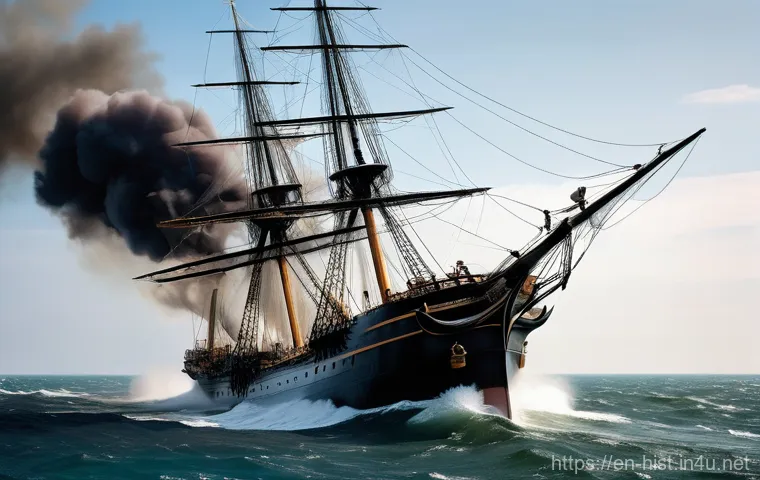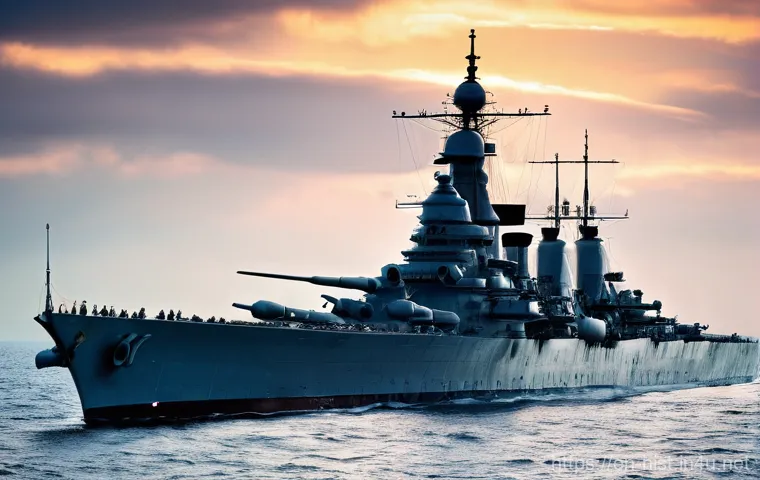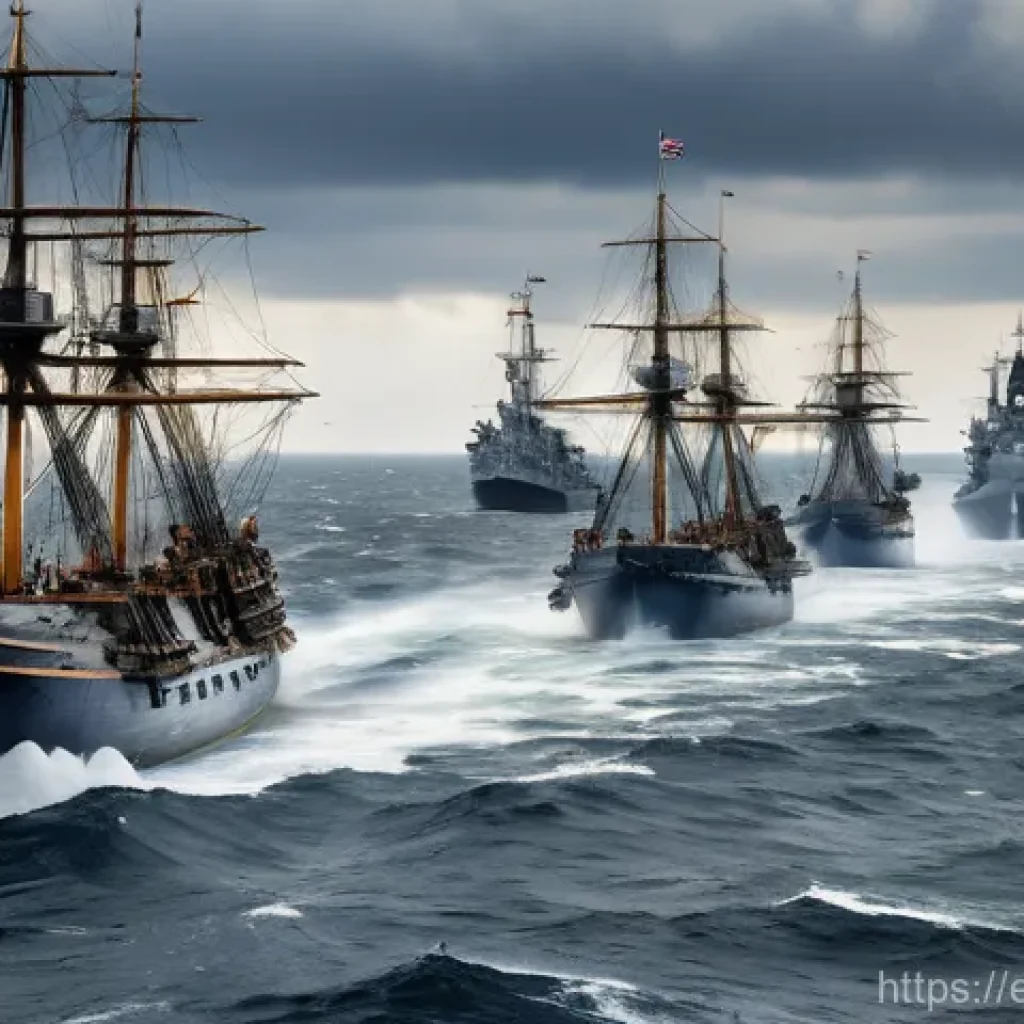Ever wondered how one island nation came to rule the waves and shape the modern world? It’s a story far grander and more intricate than most history books let on, and frankly, I’m thrilled to share my insights on it.
From my own deep dives into historical records and expert analyses, I’ve found that the British Empire’s naval supremacy wasn’t just about battleships; it was a masterclass in strategic foresight, technological innovation, and relentless ambition.
Understanding this era offers incredible lessons not just for history buffs, but for anyone trying to grasp the foundations of global power, trade, and even today’s geopolitical tensions.
We’re talking about lessons that resonate powerfully in our current climate of shifting global influence and economic competition. If you’re eager to unlock the secrets behind how an empire literally built its might upon the oceans, you’ve come to the right place.
The sheer audacity and meticulous planning behind the British Empire’s quest for naval and maritime supremacy are frankly astonishing. Imagine a world where a single nation’s fleet could project its will across every navigable ocean, safeguarding vast trade networks, enabling unprecedented exploration, and ultimately building an empire upon the waves.
This wasn’t merely about possessing the largest navy; it was about cultivating an unmatched combination of technological innovation, strategic acumen, and an unwavering commitment to naval power that redefined global politics for centuries.
Ready to uncover the true story of how they did it, and what lessons we can draw from it even now? Let’s dive right in and explore this fascinating era in detail.
The story of how the British Empire dominated the seas is one I’ve been fascinated by for years, and every time I dive into it, I uncover new layers of genius and sheer tenacity.
It wasn’t just about winning battles; it was a grand strategic tapestry woven with threads of innovation, economic might, and an unwavering national resolve.
This wasn’t some overnight success, but a carefully cultivated supremacy that shaped the modern world as we know it. I’ve often thought about what it must have been like to live in an era where the Royal Navy truly was the “Senior Service,” and its ships were the ultimate guarantors of prosperity and peace, even if that peace was often enforced with iron and gunpowder.
The Unrivaled Island Advantage

Geography as a Strategic Asset
When you look at a map, it almost seems obvious, doesn’t it? Being an island nation, Britain’s destiny was intrinsically linked to the sea. Unlike continental powers, which constantly had to worry about land invasions and maintaining massive armies, Britain could pour most of its military resources into its navy.
I’ve always seen this as their secret weapon, a geographic gift that their leaders shrewdly leveraged. This singular focus on naval power meant that while France or Spain were diverting vast sums to armies patrolling land borders, Britain was building ships, training sailors, and securing strategic outposts across the globe.
It’s truly mind-boggling how a seemingly small island could project such immense power, and it all started with understanding their unique position. This wasn’t merely about defense; it was about transforming a defensive necessity into an offensive capability that allowed them to control vital trade arteries and establish a global presence.
This maritime emphasis became deeply ingrained in the national psyche, fostered by public and governmental support that rarely wavered, especially from the 18th century onwards.
Securing Global Chokepoints
One of the most brilliant aspects of their strategy, to my mind, was the relentless acquisition of key naval bases. Imagine having a global network of refueling stations and repair docks for your ships!
From Gibraltar and Malta in the Mediterranean to vital ports in the Caribbean and Asia, these bases were like pearls on a string, allowing the Royal Navy to maintain a continuous presence in critical maritime chokepoints.
This wasn’t just about convenience; it was about logistics and projection. Ships could stay at sea longer, resupply efficiently, and project force far from home waters.
My own trips have shown me just how challenging long-distance travel can be, even with modern amenities, so I can only imagine the logistical nightmare of maintaining a global fleet in an age of sail.
The ability to control these strategic locations was fundamental to protecting trade routes and projecting diplomatic and military power, essentially making Britain a Great Power in both European and global systems.
Forging the Fleet: Innovation and Industrial Might
Technological Prowess in Shipbuilding
It’s easy to romanticize the Age of Sail, but let me tell you, the British Navy was anything but stagnant. From what I’ve observed, they were constantly pushing the boundaries of shipbuilding and naval technology.
While they might have sometimes been seen as conservative in design, the build quality and practical innovations were often superior. Things like copper sheathing for hulls, which prevented barnacles and improved speed and endurance, were game-changers.
Later, with the Industrial Revolution, Britain’s unparalleled shipbuilding capacity and financial resources became crucial. When steam power and ironclads emerged, they were quick to adapt, ensuring their qualitative advantage remained intact, even if they were sometimes playing catch-up to French innovations initially.
I find it incredible how they managed to completely replace their war fleet with new technologies like steam propulsion and metal construction, yet still maintain an overwhelming advantage.
Gunnery, Training, and Doctrine
Beyond the ships themselves, the British also excelled in what truly matters in a fight: the human element and how they fought. I’ve read countless accounts that highlight their superior gunnery practice.
British captains often emphasized gunnery training, even if it meant paying for extra gunpowder out of their own pockets, which really shows their dedication.
Their tactical doctrines, honed through constant warfare, were also incredibly effective. The transition from medieval ramming to devastating broadside cannonades was a tactical evolution they perfected, relying on concentrated force and superior firepower.
This relentless focus on drilling and practical experience meant that Royal Navy crews were often more skilled and effective in battle, a difference that, in my opinion, contributed immensely to their victories.
They weren’t afraid to fight offensively, a doctrine that defined their approach to sea control.
The Financial Backbone of Naval Supremacy
Wealth Generated by Global Trade
Let’s be real, a massive navy isn’t cheap. The financial aspect of British naval supremacy is perhaps less glamorous than tales of derring-do but absolutely essential.
Britain’s wealth, built on extensive maritime trade and finance, created a powerful feedback loop: trade generated revenues, which funded naval expansion, which in turn protected and encouraged further commerce.
It was a self-reinforcing cycle that made Britain the world’s leading economy for much of the 19th century. This wasn’t just about abstract numbers; it meant the government could afford to build, maintain, and innovate its fleet on a scale unmatched by rivals.
When I think about it, it’s a brilliant example of how economic prosperity and military power are intertwined, especially for an island nation dependent on imports for food and raw materials.
Efficient Public Finance and Investment
What truly set Britain apart, in my opinion, was their sophisticated system of public finance. After the Glorious Revolution, institutions like the Bank of England allowed the government to raise funds at lower interest rates, particularly during wartime.
Combined with parliamentary control over expenditures and a robust budget process, this meant consistent and reliable funding for the navy. Other European powers often saw their navies rise and fall with the whims of monarchs or ministers, but in Britain, there was a deeply embedded national commitment to naval superiority, backed by a stable financial system.
This long-term investment strategy allowed for continuous improvement and expansion, rather than boom-and-bust cycles.
The Human Element: Leadership and Naval Culture
Legendary Leadership and Tactical Genius
You simply can’t talk about British naval supremacy without mentioning the incredible leaders who shaped it. Figures like Lord Nelson weren’t just skilled admirals; they were tactical innovators and charismatic leaders who inspired their men to greatness.
Their willingness to deviate from rigid doctrines when the situation demanded it, combined with a keen understanding of battle psychology, often turned the tide in critical engagements.
The Battle of Trafalgar, for instance, wasn’t just a victory; it was a defining moment that solidified Britain’s advantage for decades. From my perspective, these admirals were masters of their craft, not just in strategy but in cultivating a powerful esprit de corps among their sailors.
A Deep Pool of Seamen
Beyond the admirals, the sheer quantity and quality of ordinary seamen were another vital component. As a maritime nation with extensive fishing and merchant fleets, Britain had a uniquely large pool of experienced sailors to draw upon, especially in wartime.
This steady supply of trained manpower, even with the controversial practice of impressment, was a critical advantage over continental powers with smaller maritime sectors.
These weren’t just bodies on a ship; they were individuals hardened by years at sea, forming the core of highly effective crews. This tradition of seamanship, developed independently of the military, created a deep well of talent.
Global Reach and the Pax Britannica

Enforcing a Maritime Peace
After the defeat of Napoleon in 1815, the Royal Navy ushered in an era known as the “Pax Britannica.” This wasn’t a peace enforced by a massive standing army, but by the overwhelming presence and deterrent power of the British fleet.
They essentially became the world’s policeman, suppressing piracy and safeguarding international trade routes, which was incredibly beneficial for global commerce.
This stability, maintained through sea power, allowed Britain to project military influence globally and protect its vast colonial possessions, contributing significantly to its economic and imperial expansion.
It’s fascinating to consider how this maritime power could dictate terms and maintain order across vast distances.
Protecting the Lifelines of Trade
The primary motive for the British Empire was trade, and the Royal Navy was its indispensable guardian. The protection of these vital maritime trade routes was a core role, ensuring the unimpeded flow of goods and resources to and from the empire.
Think about it: half of Britain’s food and fuel, and 95% of its trade, still arrive by sea today! The Navy’s presence secured these lifelines against rival nations, privateers, and pirates, directly contributing to Britain’s economic prosperity and global market dominance.
This constant vigilance ensured that the “workshop of the world” could always receive its raw materials and dispatch its finished products.
Adaptation Through the Ages
Responding to New Threats and Technologies
No empire, no matter how powerful, can afford to stand still. What truly impresses me about the Royal Navy’s long dominance is its ability to adapt. When new threats emerged, from French ironclads to German U-boats, they consistently innovated and responded. The launch of HMS Dreadnought in 1906, for example, rendered all existing battleships obsolete and sparked a new naval arms race, which Britain largely won through its superior industrial capacity. They weren’t always first, but they were remarkably swift in adopting and improving upon new technologies. This willingness to embrace change, even when it meant completely overhauling their fleet, was crucial for maintaining their edge.
Evolving Doctrine and Strategic Thinking
Naval doctrine also evolved significantly over centuries, moving from purely defensive roles to more offensive strategies capable of projecting power. Initially focused on protecting convoys, the capabilities provided by artillery and massing led to a shift towards offensive warfare. While sometimes slow to formally codify doctrine, the operational flexibility and experience gained from constant engagement allowed for continuous tactical refinement. Even today, the Royal Navy is looking at new doctrines, embracing uncrewed systems and hybrid fleets to meet modern challenges, showing that the spirit of adaptation remains strong. This dynamic approach to strategy, rather than a rigid adherence to old ways, was key to their enduring success.
The Enduring Legacy of Sea Power
Shaping Global Commerce and Geopolitics
The impact of British naval supremacy reverberates even today. The very foundations of global trade, international maritime law, and even the geopolitical landscape were profoundly shaped by the Royal Navy’s actions for centuries. My own understanding of global logistics makes me appreciate how much we take for granted the relatively safe and open sea lanes – a concept largely established during the Pax Britannica. Without this naval dominance, it’s hard to imagine how the industrial revolution would have spread or how globalized trade networks would have developed. The Royal Navy provided security at sea, safeguarding vital trade routes and acting as a deterrent to aggressors, which directly supports today’s global economy.
Lessons for Modern Naval Strategy
For those of us observing global powers today, the British experience offers invaluable lessons. It highlights the criticality of sustained investment, continuous innovation, strategic base networks, and a highly skilled, adaptable naval force. Countries like the U.S. Navy have even studied the Royal Navy’s history to inform their own strategies. The importance of maintaining a powerful naval presence to protect economic interests and exert diplomatic influence remains as relevant now as it was centuries ago. The challenges may change, from conventional battles to cyber threats and undersea cable protection, but the fundamental principles of sea power endure. It reminds us that for island nations, and indeed for any nation with global interests, the sea will always matter profoundly.
| Era | Key Naval Innovation / Strategy | Impact on British Supremacy |
|---|---|---|
| 16th-17th Century | Introduction of large, cannon-armed sailing ships. | Shifted defense to naval power, allowed projection beyond Europe, securing early trade routes. |
| 18th Century | Copper sheathing for hulls; improved gunnery and tactics. | Enhanced ship performance and endurance, increased effectiveness in battle, qualitative advantage over rivals. |
| Early 19th Century | Battle line tactics; Nelsonian leadership and aggressive doctrine. | Decisive victories (e.g., Trafalgar), consolidated British advantage, establishing unchallenged dominance. |
| Mid-Late 19th Century | Steam power, ironclads (e.g., HMS Warrior), Industrial Revolution shipbuilding capacity. | Maintained qualitative edge despite revolutionary changes, unparalleled capacity to build modern fleets. |
| Early 20th Century | HMS Dreadnought; “Two-Power Standard” doctrine. | Rendered all previous battleships obsolete, ensured numerical superiority over next two largest navies, intensified arms race. |
Wrapping Up Our Voyage
Diving deep into the saga of British naval supremacy truly feels like charting a course through history itself, revealing how an island nation masterfully crafted its destiny on the high seas. It’s a powerful reminder that foresight, innovation, and unwavering national resolve can create an influence that stretches across oceans and generations. What truly resonates with me is how this historical dominance continues to subtly shape the world we navigate today, from trade routes to international relations. It’s been an incredible journey exploring this with you, and I hope you’ve found it as fascinating as I have!
Intriguing Tidbits for the Curious Mind
1. Did you know that the Royal Navy’s influence was so vast that it largely suppressed the trans-Atlantic slave trade in the 19th century, transforming its role from enabler to enforcer of abolition? This often-overlooked aspect highlights the immense power it wielded for both good and ill, demonstrating how a nation’s naval might could redefine humanitarian efforts on a global scale. It’s a stark contrast to its earlier involvement and a testament to shifting national priorities.
2. The famous “Rule, Britannia!” song isn’t just a catchy tune; it embodies the national sentiment of an era when Britain truly believed the seas were its rightful domain. The lyrics reflect a deeply ingrained cultural connection to maritime power, showcasing how naval strength wasn’t just a military strategy but a core part of national identity and pride. I find it fascinating how popular culture can capture such complex historical truths so effectively.
3. The Admiralty in London, the administrative heart of the Royal Navy for centuries, was a hub of strategic brilliance. Its decisions, often made in grand rooms overlooking St. James’s Park, dictated the movements of fleets across the world. Imagine the weight of responsibility, orchestrating global operations with limited communication! It truly makes you appreciate the strategic minds at play, often operating with incomplete information.
4. Impressment, though a harsh practice, was a significant factor in manning the Royal Navy’s vast fleet. It allowed them to quickly gather experienced sailors in times of war, ensuring their ships were always crewed, albeit often by unwilling participants. This controversial system, while ethically questionable today, was seen as a necessary evil for maintaining national security and maritime dominance during that turbulent period.
5. Beyond grand battles, the Royal Navy played a crucial role in scientific exploration and charting the world. Expeditions led by figures like Captain Cook, though often for imperial expansion, also contributed immensely to geography, navigation, and botany. Their ships were not just instruments of war but also vessels of discovery, mapping unknown territories and expanding human knowledge, a legacy often overshadowed by their military prowess.
My Key Reflections on Enduring Sea Power
Reflecting on Britain’s mastery of the seas, a few critical lessons consistently stand out to me that still resonate today. Firstly, it’s undeniable that geography played a pivotal role, allowing a singular focus on naval strength rather than divided military efforts – a crucial advantage for any island nation. I’ve often thought about how different the world might look if Britain had been landlocked! Secondly, the relentless pursuit of technological innovation, coupled with a deep investment in training and tactical doctrine, proved indispensable. It wasn’t enough to just build ships; they had to be the best, and their crews the most skilled, consistently adapting to new challenges. Finally, the symbiotic relationship between economic prosperity and military might cannot be overstated. A robust financial system provided the bedrock for sustained naval power, creating a self-reinforcing cycle that truly cemented their global influence. It’s a complex, multi-faceted story that continues to offer profound insights into global power dynamics even today, reminding us that true dominance is built on more than just brute force – it’s a testament to strategic brilliance, adaptability, and unwavering national commitment.
Frequently Asked Questions (FAQ) 📖
Q: What was the real secret sauce behind Britain’s ability to dominate the seas for centuries, beyond just having big ships?
A: Oh, this is the million-dollar question, isn’t it? From my own dives into this fascinating history, it was absolutely more than just cannons and hulls.
It was a perfectly blended cocktail of relentless strategic vision, cutting-edge innovation, and frankly, a national obsession with the sea. You see, it wasn’t enough to just have a navy; Britain constantly invested in its navy.
They pioneered things like the systematic training of officers, ensuring top-notch leadership, and developed a logistical network that could resupply ships practically anywhere in the world.
Think about it – maintaining a fleet globally meant mastering everything from victualling to repair facilities across vast oceans. This wasn’t accidental; it was meticulous, long-term planning.
Plus, they were masters of naval architecture, constantly pushing the boundaries of ship design, and had an uncanny knack for leveraging their financial muscle, fueled by booming trade, to outbuild any rival.
It’s a testament to sustained ambition and practical genius, if you ask me.
Q: How did the Royal Navy’s influence extend beyond just warfare, and what impact did it truly have on global trade and exploration?
A: That’s where the story gets even richer! While the battles grab headlines, the Royal Navy’s true, pervasive power lay in its role as the ultimate enabler of trade and exploration.
I mean, think of it: merchant ships, laden with precious cargo, could sail the world with a sense of security because they knew the Royal Navy was, more often than not, patrolling the critical sea lanes.
This created an unprecedented era of global commerce, allowing British goods to reach distant markets and raw materials to flow back to fuel the industrial revolution.
Personally, I see it as the ultimate protector of the global supply chain of its time! Beyond that, the Navy was instrumental in charting unknown waters, conducting scientific expeditions (think Captain Cook!), and expanding geographical knowledge on an epic scale.
It wasn’t just about conquering new lands; it was about connecting the world, mapping it, and making it navigable for economic and scientific pursuits.
The ripple effects of that foundational work are still felt in our interconnected world today.
Q: From your perspective, what are the most powerful lessons we can still learn today from the rise and sustained power of the British Empire’s navy?
A: What an excellent question, and one I’ve pondered quite a bit myself! For me, the biggest takeaway is the profound importance of long-term strategic thinking and consistent investment in critical infrastructure.
The British didn’t just wake up one day with a dominant navy; it was the result of centuries of focused effort, adapting to new technologies, and a deep understanding of geopolitical leverage.
Today, whether you’re building a business, a national defense, or even just your personal career, that lesson about sustained commitment, continuous innovation, and knowing your core strengths truly resonates.
I’ve personally seen how organizations that prioritize foresight and adaptability, just like the Royal Navy did with its evolving fleet and global reach, are the ones that endure and thrive.
It also highlights the undeniable link between economic prosperity and robust security; one often fuels the other. It’s a historical blueprint for global influence that, despite its imperial context, offers incredibly powerful insights into power dynamics and strategic excellence even in our modern world.






